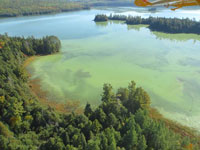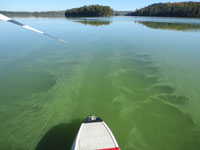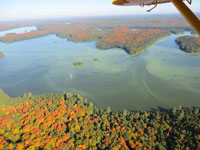Events Calendar
Current Weather
Issued: February 17, 2015
Algae Bloom Update – Dickson Lake and Lake Lavieille
Ontario Parks has issued an update on the Dickson Lake and Lake Lavieille algae bloom that closed both lakes to public travel in September 2014. For additional information see the original news bulletin called Dickson Lake and Lake Lavieille Closed to Travel and Camping - Algae Bloom issued September 25, 2014. Ontario Parks is reporting...
What caused the algae bloom in the Dickson Lake area in 2014?
Any specific cause remains unknown. The bloom was likely the result of a combination of variables that created ideal conditions to allow this form of algae to proliferate beyond what is typical in an average year. Algae blooms are more commonly associated with lakes that have a high input of nutrients associated with human activity and shoreline development. However, records of similar algae blooms in remote lakes across Ontario and Quebec are becoming more common. A large scale study is currently underway to try and bring some explanation to this phenomenon.
Ontario Parks has partnered with many experts in the field of fresh water ecology in an effort to determine a possible cause. This has included the Algonquin Fisheries Assessment Unit, Harkness Laboratory of Fisheries Research, the Aquatic Research and Monitoring Section (MNRF), the Dorset Environmental Monitoring Unit (MOECC), and the University of Western Ontario, to list a few.
Possible causes that have been considered are;
- Above average insect populations with resulting inflow of nutrients from frass (insect excrement)
- Organic inflow from a broken beaver dam or swamp
- Cooler than average summer temperatures
- Above average spring run-off
- Above average rainfall
- Above average pollen production
- Die-off of organisms – zooplankton
- Nutrient inflow - bird guano
Could an algae bloom occur again?
Since the cause of the bloom is unknown, it is impossible to predict whether this will occur again. Generally lakes that do not have anthropogenic nutrient sources (e.g. farming or intense shoreline development) do not see a bloom recurrence.
What work is being done to monitor lake conditions?
Seven water samples were collected between September 17 and November 12, 2014. Water samples were taken to identify the algal species and test for the presence of toxins. Several dissolved oxygen and temperature profile samples were also taken during this time. The Algonquin Fisheries Assessment Unit also monitored spawning activity in Dickson Lake this fall.
Dickson Lake is one of the most studied lakes in Algonquin Park. A strong baseline of data already exists that can be used to compare with current samples and conditions. A helicopter flight is scheduled for the end of February to measure oxygen levels in the water and collect water samples for lab analysis. A sediment core sample (from the lake bottom) is also planned to get a historical view of lake inputs through time.
Future sampling includes:
- Monitoring dissolved oxygen levels in mid-March;
- Monitoring water chemistry (mainly phosphate) in spring and through the summer 2015. New samples collected can be compared with historical samples;
- Short-set Broad Scale Monitoring of fish by Harkness Laboratory in summer 2015. 2015 netting results can be compared with the netting results from the same methodology done in 2012. This methodology also includes water chemistry sampling which can also be compared between the two sampling years; and
- University of Western Ontario will continue to monitor Dickson Lake as part of their large study on algae blooms in remote areas.
For more than 10 years Dickson Lake Brook Trout have been cultured in provincial fish culture stations. Dickson strain Brook Trout are the sole strain of Brook Trout currently stocked in Algonquin Park. The strain is also stocked in many lakes outside Algonquin Park. In the fall of 2014 a resampling of Brook Trout from Dickson Lake was done to refresh the cultured strain’s genetics. After the 2014 sampling event the cultured strain of Dickson Brook Trout will represent more than 90% of the Brook Trout genetics of Dickson Lake. This is a unique situation where if a winter fish kill were to occur, a discussion could be had as to whether the Brook Trout population would be rehabilitated with the Dickson strain of Brook Trout. There are only a handful of such opportunities across the province.
Are Dickson and Lavieille Lake still closed?
Reservations are currently being accepted for Dickson and Lavieille for the 2015 season. No lingering effects to the fishery or water quality are anticipated on Lake Lavieille. As a precaution, additional water samples are scheduled to be taken in February and March to test water quality and measure oxygen levels in each lake.
What have been the effects to the fish population?
There has been little to no effect on the fish populations to date. The algae is not toxic to fish. The main threat to the fish population is associated with the decaying process of the algae. Decay of the algae over the winter months requires a lot of oxygen. While the lake is ice covered there is little to no exchange of oxygen in the water. Worst case scenario is all of the oxygen will be depleted in the water before spring (lake would go anoxic) and result in a significant fish kill. However, based on similar cases and available science this remains to be highly unlikely to occur.
The bloom may have effect on this year’s reproductive cycle in Brook Trout (because of the thick algae in the water column). There may also be some fish mortality due to low or no oxygen in parts of the lake, or there may be no major impacts at all.
Continued monitoring over the next 6 weeks will determine more conclusively what, if any, the effects on the trout will be.
Are the fish safe to eat?
The fish are safe for human consumption.
Will the water be safe for swimming and recreation?
Water samples collected from Dickson Lake in September and October indicated levels of cyanobacteria too low to be toxic even though the water was still opaque and contained suspended algae. It is expected that the algae will fully decay over the winter months and the affected lakes will have returned to normal by ice out. However, as a precaution, water samples will be analyzed in March to confirm the lake is safe.
Related Information
- News Bulletin: Dickson Lake and Lake Lavieille Closed to Travel and Camping - Algae Bloom issued September 25, 2014
- More about Cyanobacteria (Health Canada)
- Algonquin Park Canoe Routes Map
- Camping in the Backcountry
Reserve your developed or backcountry campsite for your next visit.
Share your passion for Algonquin Park by becoming a member or donor.
Special regulations for Algonquin's special fishery.












